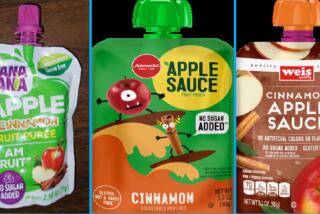Arsenic in apple juice: FDA proposes limiting level of toxic metal
- Share via
The U.S. Food and Drug Administration has proposed limiting how much arsenic can be in apple juice sold to Americans. The agency is acting in the wake of a Consumer Reports analysis on levels of the potentially poisonous metal in the popular fruit drink.
The FDA stressed that it is confident that apple juice is safe to drink, but it nonetheless said it would limit arsenic levels in apple juice to 10 parts per billion -- the same level set by the U.S. Environmental Protection Agency for drinking water.
Public debate on the topic intensified after Consumer Reports published its findings from a study last year in which researchers tested 28 different apple juices bought from stores in Connecticut, New Jersey and New York.
The magazine found that about 10% of apple juice it tested contained arsenic in excess of 10 parts per billion. The samples were from five different brands.
Most of the metal detected was inorganic arsenic, a known carcinogen. According to the FDA, inorganic arsenic has been associated with skin lesions, developmental effects, cardiovascular disease, neurotoxicity and diabetes.
The FDA, which announced its proposed limit Friday, said it has monitored arsenic levels in apple juice for 20 years and has generally found arsenic levels to be low -- with few exceptions.
“We have been studying this issue comprehensively, and based on the agency’s data and analytical work, the FDA is confident in the overall safety of apple juice for children and adults,” said FDA Commissioner Margaret A. Hamburg.
Last year the FDA released its findings from an analysis of 94 samples of apple juice. It found that 5% of those samples had arsenic levels that exceeded 10 parts per billion. Additionally, the agency said none of the samples contained excessive levels of inorganic arsenic, which is sometimes found in food. Inorganic arsenic is a naturally occurring mineral and is contained in some pesticides used in food production.
Members of the public have 60 days to comment on the FDA’s proposal. If approved, it would provide guidance for any enforcement actions, the agency said.
ALSO:
Citigroup profit jumps 42% in second quarter
Some travelers steal more than just soap from hotel rooms
San Diego ranks No. 2 on list of world’s most inventive cities
More to Read
Inside the business of entertainment
The Wide Shot brings you news, analysis and insights on everything from streaming wars to production — and what it all means for the future.
You may occasionally receive promotional content from the Los Angeles Times.










